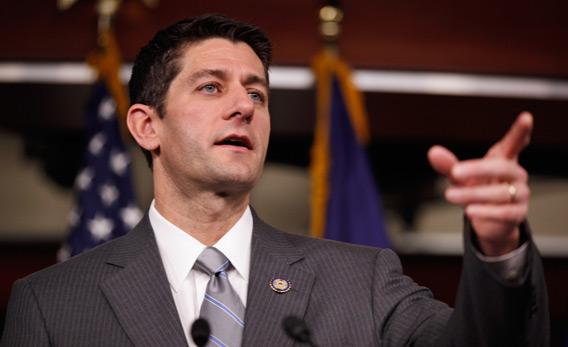Say what you will about House Budget Committee Chairman Paul Ryan, R-Wis., but he knows a thing or two about how to shift the Overton Window. If 18 months ago he’d unveiled a plan to drastically cut Medicare spending and also partially privatize the program, nobody would have thought it was in any way bipartisan or a compromise. Yet at a Dec. 15 press conference, Ryan was able to unveil the plan in partnership with Sen. Ron Wyden, D-Ore., and get it—accurately—described as a major leftward shift in his own thinking.
To understand how, we need to walk back to the incredible radicalism of the budget proposal he unveiled at the beginning of the year and—remarkably—got the vast majority of Republicans to vote for.
Ryan’s original plan had a number of astounding elements, but the most politically salient element dealt with Medicare. He offered, in essence, a sleight of hand. His goal was to produce massive long-term savings in Medicare spending relative to current projections, in order to show a way to sustain the United States government consistent with never raising taxes from the Bush-era level. This is the budgetary equivalent of Mission Impossible, since one important thing the federal government does is pay for old people’s health care. That’s an expensive task, and it’s a task that grows more expensive over time. Ryan’s solution was to simply wave his hand and decree that in the future federal expenditures on old people’s health care would increase at no more than 1 percentage point higher than the overall rate of consumer price inflation. It’s a great solution, except it’s not a solution at all. It’s an aspiration, and a totally unrealistic one.
In parallel, Ryan offered a massive structural change. Instead of getting Medicare, seniors would get a voucher to purchase private insurance. This change is, obviously, great for health insurance companies but does nothing to save money. All the savings come from the fact that the vouchers grow at an implausibly slow rate.
The plan was politically toxic—a dream come true for Democratic messagers—and even Newt Gingrich denounced it. Ryan’s new plan co-authored with Wyden represents a major walk back from the ledge in two ways.
One is that Ryan-Wyden (sort of) preserves Medicare, saying that seniors would have the option of taking their voucher to buy private insurance but also could use it to buy into traditional Medicare. It’s the equivalent, essentially, of the “public option” idea that liberals wanted in the Affordable Care Act. The other is that it caps spending growth at the aggressive, but not totally insane, rate of GDP + 1 percentage point rather than CPI + 1 percentage point. But make no mistake, this is still a very conservative plan. It’s a compromise only relative to the goalposts Ryan himself set. It combines one conservative priority (turning Medicare into a vehicle for subsidized private health insurance) with a second conservative priority (cutting government spending) and continues to protect the key conservative electoral constituency of people born in 1956 or earlier. There’s no real concession to liberals made on any point and no reason to think Democrats will rush to embrace it.
A more plausible way forward might be to drop the sleight of hand and simply address the issues of Medicare’s structure separately from the question of capping its overall cost.
For Republicans, conflating structure and cost is a convenient way to pretend that their pet privatization schemes save money. But the Democrats, the exact same conflation becomes an excuse to avoid grappling with costs. Reasonable people can and will disagree about how much of America’s total economic output should be dedicated to purchasing health care services for retirees, but the basic idea that it should be finite is clearly correct. Ryan’s initial proposal on this score was absurd, but GDP+1 percentage point is a defensible figure that I, for one, am happy to accept on the merits. Unless Medicare is constrained to a budget it will crowd out all other priorities, stampeding indiscriminately over conservative ideas on taxes and liberal ideas on infrastructure and public services alike.
Ryan-Wyden’s partial privatization is another matter entirely. If Republicans expect to get Democrats to go along with a pet project of theirs, they have to offer something in return.
Wyden is extremely well-liked in the wonkier precincts of the progressive movement, but nobody is leaping to have his back on this deal, which is seen as giving away the store on substance and complicating Democrats’ messaging efforts. Democrats on the Hill and in the White House are busy denouncing it. If Ryan wants to make Democrats an offer they might not refuse, he should agree to add a Medicare buy-in or robust public option to the new exchanges established by the Affordable Care Act. Conservatives believe that introducing private competition to Medicare will improve quality, while progressives believe that introducing public competition to the market for the non-elderly will do the same. Trading the one for the other is a reasonable logroll. What was announced this morning is pointless. It doesn’t erase the politically dangerous votes that Republican members already cast for a much more radical plan, and it doesn’t do anything to bring Democrats onboard.
But while Ryan-Wyden isn’t going anywhere as a compromise, it is a window into what might realistically happen if Republicans win everything in 2012. The original Ryan plan is far too right-wing to implement, but you could certainly imagine an emboldened new Senate Republican majority backed by President Romney or President Gingrich going for Ryan Lite. If it happens, a large share of the credit will belong to the original Ryan plan—an unworkable and politically risky proposal that’s nonetheless done a tremendous job of shifting the conversation to the point where this new proposal suddenly looks like a moderate alternative.
